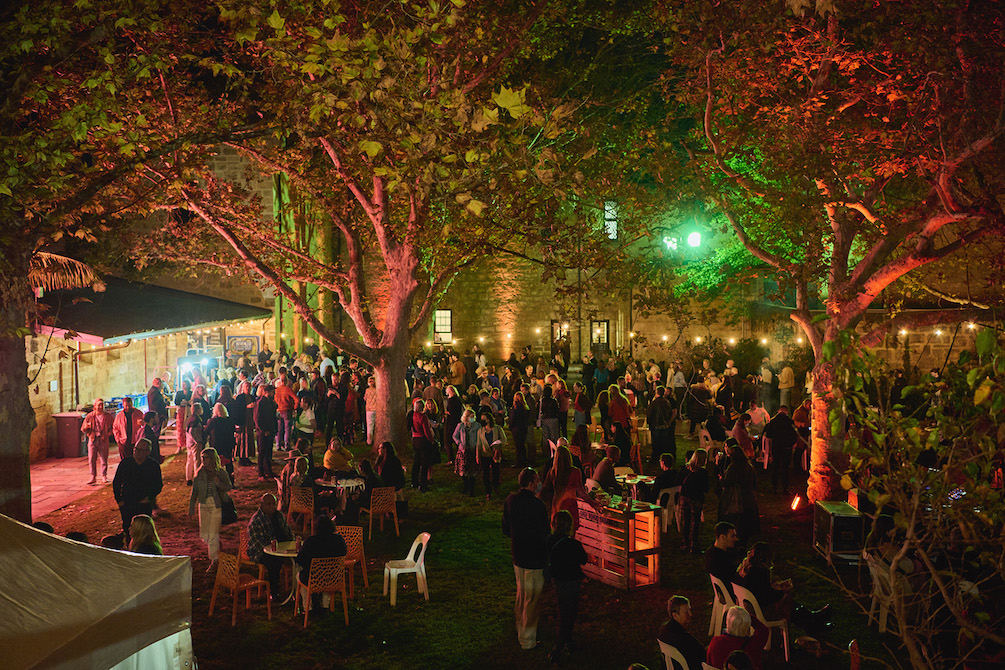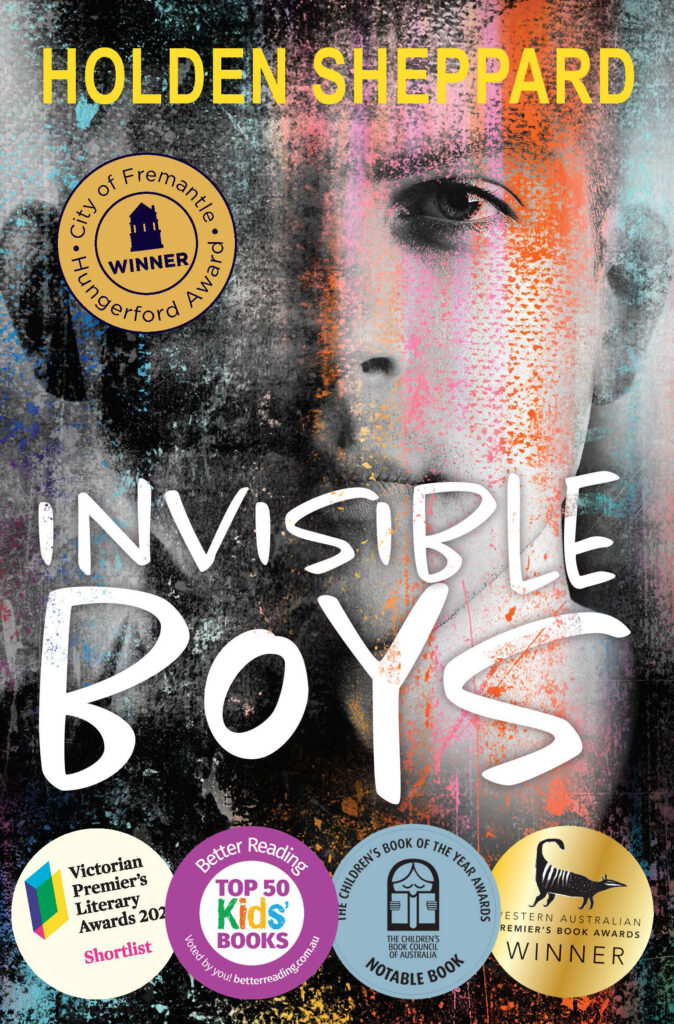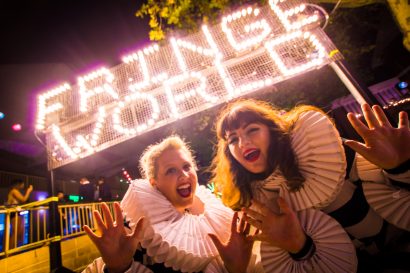Rather than fight his feelings as an outsider, Holden Sheppard uses them to empower his work – and connect with others. In the first of a series of interviews ahead of Writers Weekend, he tells Julie Hosking why authentic voices matter.
Writers Weekend: Love from the fringes
13 February 2023
- Reading time • 10 minutesPerth Festival
More like this
- Six degrees of storytelling
- Short cuts to adventure
- Writers Weekend: Drawing on the imagination
Writers Weekend is just around the corner and this bookworm couldn’t be happier. It’s long been one of my favourite parts of Perth Festival, whether hosting a session or simply soaking up the conversations with fellow word lovers. There’s just something so invigorating about being surrounded by kindred spirits.
And with a stellar line-up for this year’s theme, Steadfast as the Stars, there are plenty of reasons for bibliophiles to head to Fremantle Arts Centre later this month. The fun kicks off with All the Stars: A Party on 24 February, before a weekend of entertaining and thought-provoking sessions.
Guests include bestselling “queen of outback noir” Jane Harper; Holly Ringland (whose Lost Flowers of Alice Hart is being adapted for television); local luminary Craig Silvey, talking about his latest book Runt; journalists Amy Remeikis and Sean Kelly, discussing the worst aspects of reporting politics in Australia; and American author Sequoia Nagamatsu, zooming in to discuss his gender-bending novel How High We Go in the Dark.
Subiaco Arts Centre will also host A Day of Ideas, Djinda: The Stars on 18 February. From Writers Weekend curator Sisonke Msimang and guest curator Kylie Bracknell, it features three sessions designed to explore the “enduring effect of djinda on scientific and creative processes”.

To get a taste of the annual word fest, I asked some of the festival’s West Australian guests to answer questions related to their particular corner of the universe and the stars (literal and nebulous).
First up is Geraldton-born Holden Sheppard, a young man who always had plenty to say but wasn’t sure he had a place to say it. So he started writing instead.
This self-described lifelong misfit isn’t afraid to go to dark places in his quest to be true to the human experience. His 2019 debut Invisible Boys follows three 16 year olds as they battle to come to terms with their sexuality in a rural town. With an underlying message of hope, Invisible Boys won the Hungerford Award and was shortlisted for the Victorian Premier’s Literary Awards, among other accolades. Sheppard’s second novel, The Brink, is on the long list for the 2023 Indie Book Awards, which will be announced in March.
Julie Hosking: Tell us about the genesis of The Brink.
Holden Sheppard: The Brink originally began as a straight-up YA thriller back in 2014. It was a slasher in the early stages – more people got killed off than in the published version. After I wrote Invisible Boys, my writing style became more personal, so I rewrote The Brink as a way to process my sense of being a lifelong misfit and I channelled that into the main characters. There’s Leonardo, the geek who wants to be a tough bloke; Kaiya, the good girl who wants to go bad; and Mason, the rough footy player who’s secretly gay and in love with his best mate. I figured if you put these characters on a remote island on their Leavers week holiday, and then someone drops dead, it would become a pressure cooker situation – it’s a bit like The White Lotus meets Lord of the Flies. Readers seem to dig it!
JH: Did the accolades for Invisible Boys make it harder or easier to delve into the writing well once more?
HS: It made it much harder! I never saw myself as a literary writer, so the critical success and awards for Invisible Boys took me by surprise. Before that book, I was writing a YA fantasy novel nobody wanted to publish and selling my self-published short stories as e-books and paperbacks I got printed myself. I was not a critic’s darling – nobody gave a shit about my writing then. Then Invisible Boys blew up. I wasn’t prepared for it. I had major imposter syndrome.

I wrote Invisible Boys when I felt like I had nothing to lose, so it was easier to be confessional. I could trick myself that it would never get published so nobody would ever see it anyway. But after the first book, people were waiting for a follow-up to exceed it. It’s that bizarre capitalist expectation that the next book has to be bigger and better every single time, which is obviously unsustainable. I found that paralysing. And I initially found it harder to be as honest because there was no tricking myself this time. But the only way out was through. I had to learn to write honestly in the full knowledge that thousands of people would read, and judge, my deepest fears and flaws. Fucken terrifying – but exhilarating once you embrace it.
JH: What elements take a starring role in your writing process?
HS: Fellow WA author Amanda Curtin once asked me to sum up my writing in five words, and I said “raw, unfettered, muscular punk exorcism”. I still reckon that’s a good summary of what I do. I follow Hemingway’s advice to “write hard and clear about what hurts”, so my work is about excavating my own emotional truths and forging those into fiction. I like to write with simple, clean language that occasionally punches you in the face. I love writing dialogue that is sharp and funny and reflects the nuances of real speech.
I especially love crafting characters who are flawed and say or do bad things. I take pride in this because it’s what I believe literature should do: reflect the truth of the human condition and tell it like it is. But I feel moral puritanism is having a renaissance right now. In the literary world – especially in the YA space – we have collectively enabled a culture that wants books and characters to be blemish-free and void of nuance or anything that might be construed by the least generous reader as even slightly “problematic”.
This bloodless and anti-art approach to literature does not tell the truth. It tells a priggish, hectoring lie about what people ought to be like in a perfect world, which does not exist. There is something so depressingly not human about this current cultural moment. I am resisting it. Fuck the puritans, bring back the bad kids. I want to empower the punks and hippies and rebels and lovers and artists. I want to write characters who can express all their emotions, good and bad, because that’s what I wish for humans in real life, too. Permission to be imperfect in front of the whole world.
JH: One of your sessions at Writers Weekend is entitled On the Fringes, about writing from outside the mainstream. Can you give us some insight into what this means to you.

HS: I love the panel title because it sums me up in many ways. Aussie alt-rock band Killing Heidi – whose music I love – was once described as too alternative to be mainstream, but too mainstream to be alternative. That’s how I feel as well. My writing is too adult for YA, too teenage to be adult. Too literary for commercial fiction, too fast to be “Proper Literature”. Too bogan for the literary crowd, too eloquent to be fully bogan. Too masc for the gays, too aggressively homosexual for the straights. Always too much for someone.
So, you get constantly pushed to the fringes of every group you half-belong to and end up in a weird middle space like an oddball with no mates. That’s why writing about being a misfit in The Brink was important to me – I know how it feels to be that guy, and I want readers who feel that way to know they’re fine. People on the fringes are some of the gentlest, most deep-thinking souls. I’m looking forward to this panel and to hearing from my fellow fringe-dwelling authors on the day. More power to the misfits!
JH: If someone says reach for the stars, what springs to mind?
HS: A young person dreaming of becoming an artist and believing in that far-off dream enough to hunker down and make it a reality. Bonus points if they’re a working-class kid, because you really gotta hustle so much harder to become an artist when you come from a blue-collar background.
JH: Describe your perfect night under the West Australian sky.
HS: My perfect night under the West Australian sky would be how I spent a recent New Year’s Eve. I parked my ute at one of Perth’s northern beaches in the early evening. My husband and I had dinner and a few drinks while chilling on a mattress in the back of the ute, and talked about our goals and dreams for the coming year while we watched the sun set over the Indian Ocean. Bloody beautiful.
JH: If you had to sum up your star power, what would it be?
HS: I don’t know if it’s my star power, but fellow Aussie author Nigel Featherstone once referred to my writing as “fearless”, and I still think that’s one of the nicest compliments I’ve ever received about who and what I am. Obviously, I am not fearless at all as a person. But I do have a bold personality and over time, I have learned how to feel the fear and do it anyway. The way I write and the way I carry myself in the world is with a degree of courage, a lack of shame, and a willingness to cop flak for being who I am, which seems to be what people respond to.
JH: What do you wish the universe would bless you with?
HS: This is sappy, but just continued health and love … I’m at the point in my life where I realise how valuable those things are. But as a third wish, I would defo not say no to the universe blessing me with more money. Gimme dem royalties, Universe!
JH: What are you looking forward to the most at Steadfast as the Stars?
HS: There’s a panel on men and masculinity with authors Laurie Steed and Barry Nicholls on it, chaired by Josephine Taylor, so I am keen on seeing that – masculinity is a major thematic interest in my work. The All the Stars party should be a blast, too. And I should probably plug my own session, right? I’m chatting about The Brink with the Literature Centre’s Natalya Hawrylak on Saturday 25 February, and it’s actually the first time I’m visiting Fremantle to talk about this book. I’m pumped to hear what Freo people make of The Brink!
Like what you're reading? Support Seesaw.






